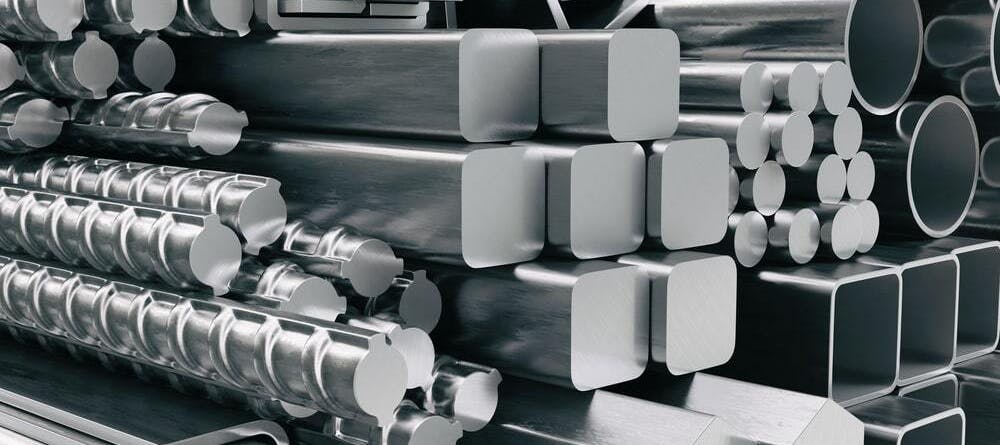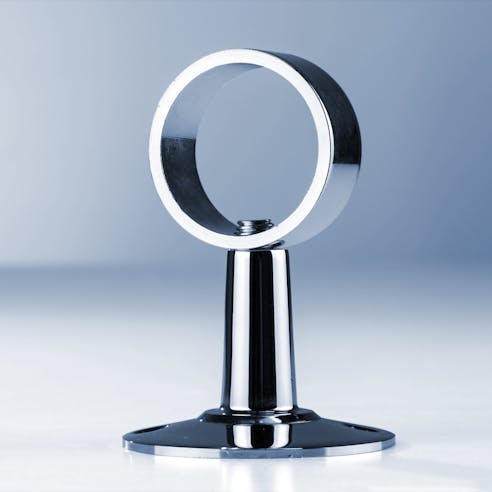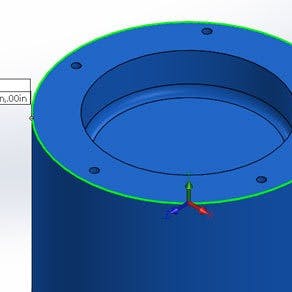Steel CNC Machining Service
Get instant quotes on custom steel machined parts with our Online Steel CNC Machining Service. Make quick turn prototypes and production parts in days with free standard shipping on all US orders. ISO 9001:2015, ISO 13485, IATF 16949:2016, and AS9100D certified. ITAR registered.

Steel CNC Machining
Steel is an alloy of iron with approximately 1% carbon. Small amounts of other alloying elements like molybdenum and chromium may be added to improve its properties. Steel offers a great balance between cost and functionality since it is easy to machine and weld. It will, however, oxidize over time and therefore needs surface treatments for protection.
Steel is one of the most widely used manufacturing materials and is used in every major industry from construction to automotive. Its cost-effectiveness coupled with some very useful properties makes it a versatile material. Listed below are some of the mild steel variants and high-strength steel variants Xometry offers in CNC machining.
Steel 1018
Generally referred to as mild steel, 1018 is highly weldable and well suited to surface hardening processes such as carburizing. Once carburized, this material is typically used for gears, worms, and mold components.
| Tensile Strength, Yield (MPa) | Shear Modulus (GPa) | Elongation at Break (%) | Hardness (Brinell) | Density (g/cm^3) |
|---|---|---|---|---|
Tensile Strength, Yield (MPa) 370 | Shear Modulus (GPa) 78 | Elongation at Break (%) 15 | Hardness (Brinell) 126 | Density (g/cm^3) 7.87 |
* Generalized values based on cold-drawn material. For reference only.
Steel 4130
This type is often known as alloy steel due to its increased levels of alloying elements when compared to normal mild steel. This alloy contains chromium and molybdenum as strengthening elements. These elements significantly improve its mechanical properties. Applications can include taps, drills, and aircraft engine mountings.
| Tensile Strength, Yield (MPa) | Shear Modulus (GPa) | Elongation at Break (%) | Hardness (Brinell) | Density (g/cm^3) |
|---|---|---|---|---|
Tensile Strength, Yield (MPa) 435 | Shear Modulus (GPa) 80 | Elongation at Break (%) 25.5 | Hardness (Brinell) 197 | Density (g/cm^3) 7.85 |
* Generalized values based on normalized, air-cooled material. For reference only.
Steel 4140
Steel 4140 is very similar to 4130 but has an increased carbon content. The bonus carbon improves its strength and allows for better hardening properties. Extra chromium is also added for corrosion resistance. Applications can include thin-walled pressure vessels, spindles, and high-strength bolts.
| Tensile Strength, Yield (MPa) | Shear Modulus (GPa) | Elongation at Break (%) | Hardness (Brinell) | Density (g/cm^3) |
|---|---|---|---|---|
Tensile Strength, Yield (MPa) 675 | Shear Modulus (GPa) 80 | Elongation at Break (%) 17.8 | Hardness (Brinell) 302 | Density (g/cm^3) 7.85 |
* Generalized values based on normalized, air-cooled material. For reference only.
Steel 4140 PH
This grade of steel is a pre-hardened version of standard 4140 steel that exhibits excellent mechanical strength and hardness properties. Its pre-hardening eliminates the need for heat treatment after machining. This is ideal if the heat treatment will cause unacceptable distortion in the finished part. Typical applications include shafts, arbors, and molds.
| Tensile Strength, Yield (MPa) | Shear Modulus (GPa) | Elongation at Break (%) | Hardness (Brinell) | Density (g/cm^3) |
|---|---|---|---|---|
Tensile Strength, Yield (MPa) 685-896 | Shear Modulus (GPa) 80 | Elongation at Break (%) 14-19.2 | Hardness (Brinell) 271-301 | Density (g/cm^3) 7.85 |
* Generalized values. For reference only.
Steel A36
This grade of steel is inexpensive and easy to weld, so it is a very common grade of low carbon steel. It is generally used in fabrication applications and structural supports.
| Tensile Strength, Yield (MPa) | Shear Modulus (GPa) | Elongation at Break (%) | Hardness (Brinell) | Density (g/cm^3) |
|---|---|---|---|---|
Tensile Strength, Yield (MPa) 250 | Shear Modulus (GPa) 79.3 | Elongation at Break (%) 20 | Hardness (Brinell) 119 | Density (g/cm^3) 7.85 |
* Generalized values. For reference only.
Steel 1215
This grade of steel is considered a free machining steel due to its high sulfur content. However, the weldability of this material is poor. Typical applications can include studs, screws, pins, and, in general, components that require large amounts of machining.
| Tensile Strength, Yield (MPa) | Shear Modulus (GPa) | Elongation at Break (%) | Hardness (Brinell) | Density (g/cm^3) |
|---|---|---|---|---|
Tensile Strength, Yield (MPa) 415 | Shear Modulus (GPa) 80 | Elongation at Break (%) 10 | Hardness (Brinell) 167 | Density (g/cm^3) 7.87 |
* Generalized values based on cold-drawn material. For reference only.
Steel 4340
This steel is a high-strength, low-alloy metal. It exhibits impressive toughness and strength and maintains these properties at relatively high temperatures. Typical applications can include gears, shafts, and other structural parts.
| Tensile Strength, Yield (MPa) | Shear Modulus (GPa) | Elongation at Break (%) | Hardness (Brinell) | Density (g/cm^3) |
|---|---|---|---|---|
Tensile Strength, Yield (MPa) 470 | Shear Modulus (GPa) 74 | Elongation at Break (%) 22 | Hardness (Brinell) 217 | Density (g/cm^3) 7.85 |
* Generalized values based on annealed condition. For reference only.
A2 Tool Steel
A2 steel is a type of air-hardening, cold-working steel. It has good wear resistance and experiences minimal distortion during heat treatment or hardening processes. Compared to other types of tool steel, A2 steel is relatively easy to machine. It is one of the most commonly used steel grades for making tools such as punches, trimming and forming dies, sheering blades, and molds.
| Tensile Strength, Yield (MPa) | Shear Modulus (GPa) | Elongation at Break (%) | Hardness (Rockwell C) After Heat Treating | Density (g/cm^3) |
|---|---|---|---|---|
Tensile Strength, Yield (MPa) 1275-1585 | Shear Modulus (GPa) 78 | Elongation at Break (%) 1-5 | Hardness (Rockwell C) After Heat Treating 57-62 HRC | Density (g/cm^3) 7.86 |
* Generalized values based on air-hardened condition. For reference only.
O1 Tool Steel
O1 steel is an oil-hardening, cold-working steel. It is characterized by it’s strong wear resistance and ability to retain sharp edges. It is used in creating punching, cutting, and stamping tools, as well as in blades and other cutting tools.
| Tensile Strength, Yield (MPa) | Shear Modulus (GPa) | Elongation at Break (%) | Hardness (Rockwell C) After Heat Treating | Density (g/cm^3) |
|---|---|---|---|---|
Tensile Strength, Yield (MPa) 400 | Shear Modulus (GPa) 72 | Elongation at Break (%) 20% | Hardness (Rockwell C) After Heat Treating 63-65 HRC | Density (g/cm^3) 7.83 |
* Generalized values based on annealed condition. For reference only.
Finishes and Post-Processing Options
We offer a wide range of surface finishes applicable to steel.
Nickel plating: Carbon steels can be uniformly nickel-plated to improve their corrosion and wear resistance. This process deposits a 0.1mm layer of nickel on the surface of the part.
Powder coat: Powder coating creates a robust surface finish that is typically between 0.006” (0.1524 mm) and 0.012” (0.3048 mm) thick. Since bare steel rusts easily, it can benefit from powder coating.
Carburizing: Some steels can have their properties significantly improved through carburizing. This process infuses the surface with additional carbon that improves its hardness and wear-resistance.

Cost-saving Design Tips
Steel is one of the cheapest materials suitable for CNC machining. However, take care to avoid unnecessary machining costs. Below are some cost-saving design tips:
Material selection: Cheap though it may seem, it’s important to choose the best steel for your particular application. Using high-strength alloy steel where mild steel will work increases costs for no added benefit.
Part setup: Designing a part to reduce the number of machining setups can significantly reduce the cost of manufacturing. This is especially true when machining cheap materials as any cost savings on the material can be quickly eliminated by expensive setups.

